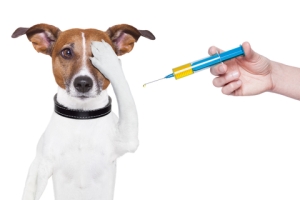 In a previous post, Over-vaccination of dogs with unnecessary ‘boosters’, I suggest use of the questionable term ‘booster’ in relation to canine core modified live virus (MLV) vaccines for parvovirus, distemper virus and adenovirus is resulting in extensive unnecessary over-vaccination of already immune dogs.
In a previous post, Over-vaccination of dogs with unnecessary ‘boosters’, I suggest use of the questionable term ‘booster’ in relation to canine core modified live virus (MLV) vaccines for parvovirus, distemper virus and adenovirus is resulting in extensive unnecessary over-vaccination of already immune dogs.
I forwarded a detailed letter on this matter to Professor Ronald Schultz, a member of the World Small Animal Veterinary Association’s Vaccination Guidelines Group, complaining about the confusing and misleading use of the term ‘booster’ in vaccination guidelines issued by the WSAVA Vaccination Guidelines Group.
I have received a response from Professor Schultz in which he says:
“I agree that the term “booster” is misleading in that many of the already immune dogs probably receive no beneficial “booster effect” from an infectious vaccine because the virus (e.g. CDV, CPV-2, CAV-2)* is immediately neutralized. Therefore, it cannot infect the cells and replicate! It is only in those dogs that have no viral antibody that the vaccine will boost the immune system, both the cellular and humoral response to the virus. It is these antibody negative dogs that I recommend revaccinating, not dogs with detectable antibody. There are, however, components of the vaccines that are almost always boostered such as fetal bovine serum components and other extraneous proteins that are in all vaccines. Obviously, these are components of the vaccine we don’t want to boost especially in a dog that genetically is predisposed to an adverse reaction (e.g. hypersensitivity). That is why we are trying to prevent annual revaccination with the Core Vaccines that provide long term immunity in a majority of most dogs, but not all!”(1) (*Note: CDV, CPV-2 and CAV-2 are the canine diseases distemper virus, parvovirus and adenovirus [hepatitis]).
 So I wonder if the WSAVA vaccination guidelines will be amended accordingly?
So I wonder if the WSAVA vaccination guidelines will be amended accordingly?
Meanwhile annual revaccination of dogs for diseases such as parvovirus remains rife in Australia. A recent article titled “The Deadly Canine Parvovirus – Is Your Dog At Risk?”, published in Dogs NSW magazine in September 2013, works as a fear-mongering advertorial for the veterinary industry, including the key message: “Always have your vaccinations up to date: Make sure dogs are vaccinated as puppies and then annually thereafter.”(2) (My emphasis.)
Business as usual then for the over-vaccinating veterinary industry…
I am pursuing this matter further.
Postscript: In his response to me, Professor Schultz refers to “fetal bovine serum components and other extraneous proteins that are in all vaccines. Obviously, these are components of the vaccine we don’t want to boost especially in a dog that genetically is predisposed to an adverse reaction (e.g. hypersensitivity)”.
Fetal bovine serum is also in the human live Measles/Mumps/Rubella (MMR) vaccine, see for example Merck’s MMR II(3). So it doesn’t seem like a good idea to have unnecessary doses of MMR vaccine either… In this regard refer to my letter to Paul Offit: Questioning the ethics of mandated vaccination of children with the measles/mumps/rubella (MMR) ‘booster’ second dose.
References:
- Email response from Professor Ronald Schultz to Elizabeth Hart, 22 August 2013. (I have Professor Schultz’s permission to quote him.)
- Charlotte Long. The deadly canine parvovirus – is your dog at risk? Dogs NSW, September 2013, pp 21-25.
- M-M-R ®II (Measles, Mumps, and Rubella Virus Vaccine Live). Merck & Co., Inc. http://www.merck.com/product/usa/pi_circulars/m/mmr_ii/mmr_ii_pi.pdf